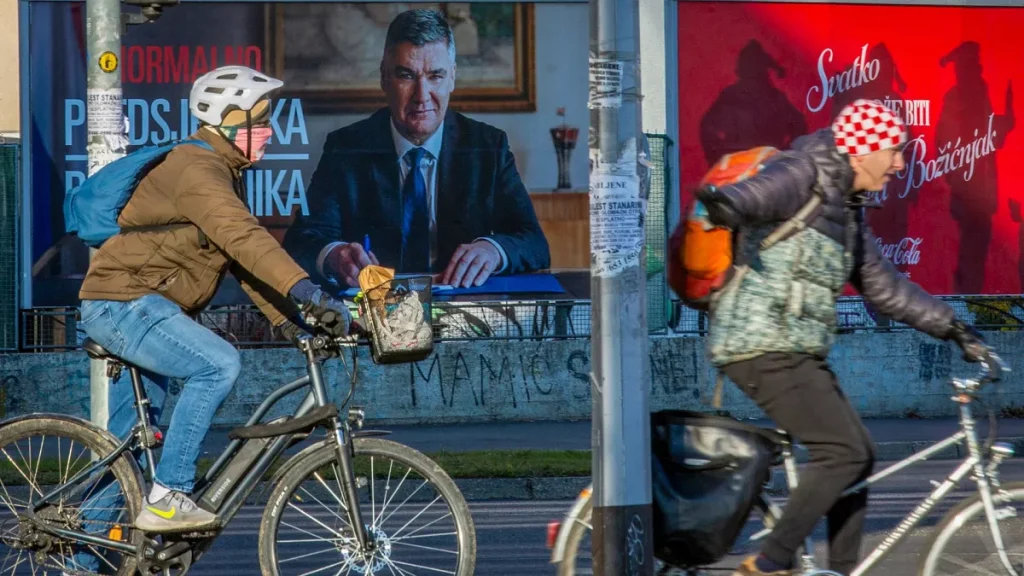Croatians cast ballots for a new president on Sunday, December 29, 2024, and according to opinion polls, the outspoken incumbent Zoran Milanovic is the front-runner.
With the support of the conservative HDZ party, which presently controls the nation, Dragan Primorac is his most likely main opponent among the eight candidates for the primarily ceremonial position.
The election takes place while the 3.8 million-person nation, a member of NATO and the European Union, battles severe inflation, pervasive corruption, and a labour shortage.
An opinion poll issued on Friday showed that Primorac had 20 per cent of the vote, while Milanovic had 37 per cent.
However, a runoff is scheduled to select the new head of state in two weeks, since none of the contenders are predicted to receive more than 50 per cent of the vote to win outright.
The campaign included frequent insult exchanges between the two main contenders, with Milanovic calling Primorac “fake as a 13-euro note” and “boring.”
The president of Croatia is in charge of the nation’s military and influences foreign affairs.
Although the office has few powers, many people think it is essential to maintaining the political balance of power in a nation that has been primarily governed by the HDZ since 1991.

“You shouldn’t put all your eggs in one basket,” Nenad Horvat, a forty-year-old salesman, told AFP.
“The last barrier that all levers of power fall into the hands of HDZ,” in his opinion, is the current president.
As he cast his ballot in Zagreb, unemployed voter Davor Kallay expressed his expectation of “some changes for the better since independence, but I’m afraid these elections will not bring them… lower inflation, higher wages.”
For almost twenty years, one of Croatia’s most prominent and colourful political characters has been Milanovic, a former left-wing prime minister.
Milanovic, 58, is a perceptive and articulate individual who won the 2020 election for president of the opposition Social Democrats (SDP) by promising to support liberalism and tolerance.
However, he frequently employed divisive and populist rhetoric to use his position to disparage political rivals and EU representatives.
Milanovic has criticised the West’s military assistance to Kyiv despite denouncing Russia’s aggression against Ukraine.
Andrej Plenkovic, the prime minister, responded by calling him a pro-Russian who is “destroying Croatia’s credibility in NATO and the EU.”
“I want to keep Croatia from being dragged into war,” Milanovic retorted.
“No Croatian soldier will fight someone else’s wars as long as I am president,” he declared this month.
He frequently accuses Plenkovic and his HDZ party of widespread corruption and refers to the premier as a “serious threat to Croatia’s democracy.”
At the campaign, he declared, “I am a guarantee of the control of the octopus of corruption… headed by Andrej Plenkovic.”
The election is seen by many as a continuation of the long-running conflict between two influential politicians.
Zarko Puhovski, a political analyst, told AFP that the prime minister and president’s dispute remains at the centre of this. “The rest are merely incidental subjects.”
The 59-year-old Primorac ran as a “unifier,” advocating for patriotism and family values.
He claimed that the election would reveal “whether Croatia is turning towards East or West… towards divisions or unity.”
After 15 years away from politics, Primorac, a doctor and physicist, constantly accused Milanovic of “disgracing Croatia,” a charge that struck a chord with many voters.
Barbara Sente Ocvirk, 36, told AFP she thinks his primary opponent will do better and that she is “not satisfied with the way our current
Opponents contend that Primorac is only the HDZ’s attack dog to incite Milanovic and lacks political charisma and credibility.
Exit polls are anticipated twelve hours after the voting stations’ opening at 7:00 am (0600 GMT).
The official results are due late Sunday.

